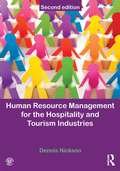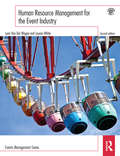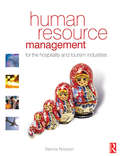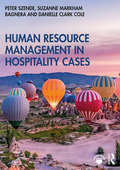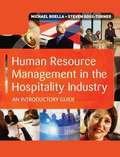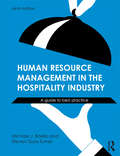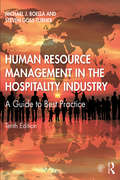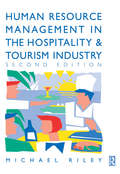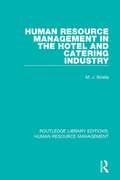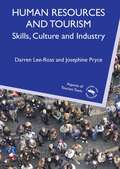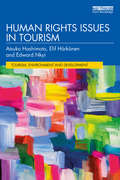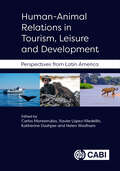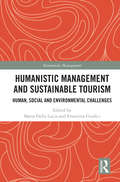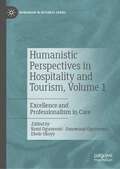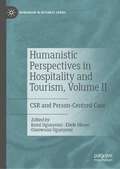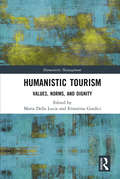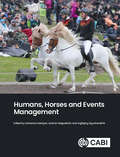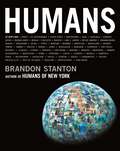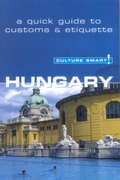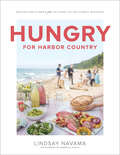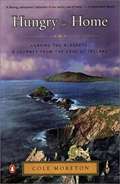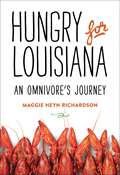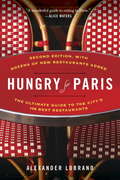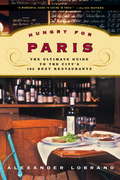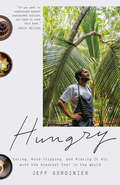- Table View
- List View
Human Resource Management for Hospitality, Tourism and Events
by Dennis NicksonPlease note: this title will publish in January 2012. This textbook explores the policies and practices employed in the management of people working in the tourism, hospitality and events industries. It considers the nature of these industries and the varied approaches that organizations take with the handling of matters such as recruitment, health and welfare and remuneration. This book is enriched with topical case studies that describe and illustrate the human resource management behaviour of airlines, hotel chains and other international companies in the sector, providing real world industry perspective. With a clear, reader friendly layout containing chapter outlines and objectives and examples of best practice, this is the ideal guide to HRM for any student on a hospitality, tourism or related course.
Human Resource Management for the Event Industry (Events Management)
by Lauren White Lynn Van Der WagenHuman Resource Management for Events still remains the only text to introduce students to the unique application of HR principles in the context of a highly complex event environment. Linking theory, research and application it looks at the purpose and processes of managing such a sizable & varied workforce in a highly pressured environment through the differing and various types of events from sporting to arts to business events.Since the first edition, there have been many important developments in this field and this second edition has been completely revised and updated in the following ways: extensively updated content to reflect recent issues and trends including: labour markets and industry structure, impacts of IT and social media, risk management, volunteer motivation, talent management, equal opportunities and managing diversity. All explored specifically within the Events Industry extended volunteer chapter, including new material on ethics, volunteer motivation and satisfaction. a new chapter on Internal Communications, looks at how an effective internal communication plan can be achieved which is a critical part of HR strategy in the unique event environment. updated and new international case studies throughout to explore key issues and show real life applications of HRM in the Events Industry. supported with new lecturer and students online resources including: power point slides, suggested answers to review questions, web & video links to additional resources and a student test bank. Written in a user friendly style, each chapter includes international examples, bulleted lists, guides to further reading and exercises to test knowledge.
Human Resource Management for the Hospitality and Tourism Industries
by Dennis NicksonHuman Resource Management for the Hospitality and Tourism Industries takes an integrated look at HRM policies and practices in the tourism and hospitality industries. Utilising existing human resource management (HRM) theory and practice, it contextualises it to the tourism and hospitality industries by looking at the specific employment practices of these industries, such as how to manage tour reps or working in the airline industry.It initially sets the scene with a broad review of the evidence of HRM practice within the tourism and hospitality industries. Having identified the broader picture, the text then begin to focus much more explicitly on a variety of HR policies and practices such as:* recruitment and selection: the effects of ICT, skills required specific for the industry and the nature of advertising* legislation and equal opportunities: illegal discrimination and managing diversity * staff health and welfare: violence in the workplace, working time directives, smoking and alcohol and drug misuse* remuneration strategies in the industry: the 'cafeteria award' approach, minimum wage and tippingHuman Resource Management for the Hospitality and Tourism Industries is illustrated throughout with both examples of best practice for prescriptive teaching and discussion, and international case studies to exercise problem solving techniques and contextualise learning. It incorporates a user friendly layout and includes pedagogic features such as: chapter outlines and objectives, HRM in practice - boxed examples, reflective review questions, web links' discussion questions and further reading.Accompanying the text are online supplementary lecturer materials including downloadable figures from the book, PowerPoint slides, further cases and extra exercises and points for discussion.
Human Resource Management in Hospitality Cases
by Peter Szende Suzanne Markham Bagnera Danielle Clark ColeHuman Resource Management in Hospitality Cases adopts a practical case-based approach to develop critical thinking and problem-solving skills in future hospitality managers. Using tried-and-tested real-life scenarios, this book thoroughly prepares hospitality students for a career in the field. Chapters are comprised of 75 short vignettes, split into nine sections that reflect and cover the primary challenges facing hospitality managers on a daily basis, including leadership credibility, building and managing employee performance, managing a diverse workforce, dealing with problem behaviors, and many others, all contextualised within the hospitality industry. With a main "think point" and series of questions for each case, the book is a highly insightful and engaging read. Suggested answers and solutions to the questions can be found within the extensive online resources that complement the book. Each section is also contextualized and theorized with an additional reading section, organized by key concept. This book will be essential for all students of hospitality and an invaluable resource for current practitioners in the field as well.
Human Resource Management in the Hospitality Industry
by Michael Boella Steven Goss-TurnerNow in its eighth edition, Human Resource Management in the Hospitality Industry: an introductory guide, is fully updated with new legal information, data, statistics and examples, and includes brand new material on multi unit operations and management.Taking a 'process' approach, it guides the reader through every stage from HR planning through recruitment to termination/separation, covering the following issues:* Selection, appointment and induction* Training and management development* Labour turnover* Employee relations and employment law* Managing people and customer care* Business EthicsWritten in a user friendly style, each chapter includes international examples, bulleted lists, guides to further reading and exercises to test knowledge.
Human Resource Management in the Hospitality Industry: A Guide to Best Practice
by Michael Boella Steven Goss-TurnerNow in its ninth edition, Human Resource Management in the Hospitality Industry: A Guide to Best Practice, is fully updated with new legal information, data, statistics and examples. Taking a 'process' approach, it provides the reader with an essential understanding of the purpose, policies and processes concerned with managing an enterprise's workforce within the current business and social environment. Since the eighth edition of this book there have been many important developments in this field and this ninth edition has been completely revised and updated in the following ways: Extensively updated content to reflect recent issues and trends including: labour markets and industry structure, impacts of IT and social media, growth of international multi - unit brands, role of employer branding, talent management, equal opportunities and managing diversity. All explored specifically within the Hospitality Industry The text explores key issues and shows real life applications of HRM in the Hospitality industry and is informed through the authors' research projects within Mitchells & Butler's plc, Pizza Express, Marriott Hotels and Café Rouge. An extended case study drawing from the authors' experience working with Forte and Co., Centre hotels, Choice Hotels and Bass, Price Waterhouse and Grant Thornton Written in a user friendly style and with strong support from the Institute of Hospitality, each chapter includes international examples, bulleted lists, guides to further reading and exercises to test knowledge.
Human Resource Management in the Hospitality Industry: A Guide to Best Practice
by Steven Goss-Turner Michael J. BoellaHuman Resource Management in the Hospitality Industry: A Guide to Best Practice takes a ‘process’ approach and provides the reader with an essential understanding of the purpose, policies and processes concerned with managing an enterprise’s workforce within the current business and social environment. Since the ninth edition of this book there have been many significant developments in this field and this new edition has been completely revised and updated in the following ways: Extensively updated content to reflect recent issues and trends relevant to the hospitality industry including: changing labour market profiles and the ‘gig’ economy, the digital transformation of HRM practices, employer branding developments, talent management strategies, employee well-being considerations, and contemporary concerns over diversity, gender and harassment at work. Five new chapters on: organizational culture, modern labour markets, emotions and well-being, careers in hospitality, and digital HRM. New international case studies throughout to explore key issues and show real-life applications of HRM in the hospitality industry. Written in a user-friendly style, each chapter includes international examples, bulleted lists, guides to further reading and exercises to test knowledge.
Human Resource Management in the Hospitality and Tourism Industry
by Michael RileyThis fully updated and expanded second edition of Human Resource Management examines the role of human resource management in the hospitality and tourism industry. The subject is approached from four perspectives: * the social psychology of managing people * the economics of labour * the practical techniques * strategy. The author argues that labour costs, labour utilisation, labour market behaviour and pay are inseparable from the skills of managing people. The book contains an important analysis of the labour market for this industry and now, in its second edition includes, among others, chapters on attitude measurement, customer-employee relations, questionnaire design and organizational change. Human Resource Management in the Hospitality and Tourism Industry is written in a clear, user-friendly style and offers a challenging view of the subject and an opportunity to learn an important aspect of management in an applied context. It is appropriate for degree level students and practitioners in the industry.
Human Resource Management in the Hotel and Catering Industry (Routledge Library Editions: Human Resource Management)
by M. J. BoellaThis book, first published in 1987, gives valuable insights into the characteristics of employment in the hotel and catering industry and useful guidance on personal techniques. It deals with fundamental issues, such as personnel policy, as well as with practical techniques. Human Resource Management in the Hotel and Catering Industry has been written as an introductory text to human resource management in the hospitality industry. It is suitable reading for students, line managers and personnel managers in the many different sectors of the business.
Human Resources and Tourism
by Darren Lee-Ross Josephine PryceThe tourism industry provides employment for literally millions of individuals. Despite global recessions, terrorist attacks and other catastrophes this is likely to remain unchanged in the long-term. Resilience of this nature helps tourism remain a major global employer in both developed and emerging economies. The important role played by tourism workers cannot be overstated; some argue that they actually define the product on offer. Accordingly, mediocre or poor performance gives rise to an unremarkable service experience or one to which customers would not return willingly. The inextricable link between the calibre and performance of staff and service delivery is a key issue for human resources management. This challenge is further complicated by a number of structural characteristics including: dominance of unaffiliated small to medium-sized organizations; high levels of labour turnover; and a heterogeneous workforce with individuals having a wide variety of cultural differences and employment aspirations. This book accounts for the above factors using an approach which is part prescriptive and part enquiry or research-oriented. In doing so, espoused 'HRM convention' may be understood against 'HRM in practice'. Additionally, by using this method we hope to instil a sense of enquiry in the reader. This is a necessary intellectual asset for the future and will also allow the individual to make a positive contribution in the workplace.
Human Rights Issues in Tourism (Tourism, Environment and Development Series)
by Atsuko Hashimoto Elif Harkonen Edward NkyiThis book uniquely focuses on human rights issues associated with tourism development and tourism businesses. Tourism is a manifestation of globalization and it intersects with human rights on so many levels. These implications are increasingly relevant in light of the COVID-19 pandemic and subsequent global economic hardship. Split into two main sections, the first establishes a background to human rights issues with reference to tourism, and the second provides a multi-disciplinary analysis of a range of selected human rights issues in tourism; these include displacement, security, privacy, discrimination, freedom of movement, the rights of Indigenous people, sex tourism and labour conditions. All chapters include case studies to showcase specific issues such as legal rulings or tourism policies/regulations. This book is written by a highly regarded team of authors specializing in tourism studies and human rights law. This significant volume on the interaction between tourism development and the safeguarding of human rights will be of interest to a variety of disciplines, in the fields of tourism, political science and tourism/human rights.
Human-Animal Relations in Tourism, Leisure and Development: Perspectives from Latin America
by Katherine Dashper Carlos Monterrubio Xavier López-Medellín Helen WadhamHumans and animals have developed multiple and complex interactions in the fields of tourism, leisure, and development. However, much of the existing research on how humans and animals interact in these fields has emerged from within the context of developed countries. As a result, little has been documented about human-animal interactions in the socioeconomic, cultural, and environmental contexts of countries in the Global South. Specifically, the diversity and complexity of interspecies relationships in tourism, leisure, and local development in Latin America have been largely ignored in Anglo-Saxon literature. This has resulted in a limited, partial, and hegemonic understanding and debate about human-animal relationships globally, dominated by certain regions of the world. This book addresses this gap by documenting multiple and complex relationships between humans and animals in the fields of tourism, leisure, and local development in countries in Latin America. The book: Brings together empirical and conceptual works that reveal different disciplinary, theoretical, ethical, methodological, and practical perspectives. Reveals how human-animal relationships - both domestic and wild - can result in co-created interspecies experiences, conflicts, conservation efforts, welfare, and local development of human societies in the region. Equips stakeholders with conceptual frameworks and actionable tools to formulate policies that blend animal welfare and sustainability in Latin American tourism and recreation strategies. Challenges dominant narratives from the Global North regarding tourism and conservation, promoting a more inclusive and nuanced approach. This book will be of interest to researchers, professionals and policymakers within tourism, leisure, animal welfare, conservation and destination development.
Humanistic Management and Sustainable Tourism: Human, Social and Environmental Challenges (Humanistic Management)
by Maria Della Lucia Ernestina GiudiciTourism is a fast-growing and changing industry, which has become a driver of economic development in both developed and underdeveloped countries. While the tourism industry’s potential for shared value creation and sustainable development is acknowledged, the concerns around the environmental and social pressures remain a challenge for businesses, organizations, and destinations. This is because sustainable tourism arguably conflicts with the predominant neoliberal structure of the economy and with the hierarchical, profit- and consumption-driven societies. The emphasis on competition, growth, and profitability may undermine economic viability itself by consuming unreproducible resources and by undermining the six essential elements—dignity, people, prosperity, social justice, planet, and partnership—that are conceptually linked to sustainable development. The crises recurrently challenging the global travel and tourism environment, including climate change, bushfires, extreme weather disasters, pandemics, and the financial crisis, show the weaknesses of neoliberal approaches and the collective economic dependency of countries on tourism that is vulnerable, if not completely unsustainable. This vulnerability asks for understanding that the collective future depends on developing entirely new approaches and interpretation of tourism to effectively respond to the human, societal, social, and climate challenges. This book offers a novel and original perspective entailing the application of a humanistic management approach to sustainable tourism, which is centered on the value of human life, the protection of human dignity and the promotion of well-being. Multiple theoretical approaches, methods, and practical cases, on an international scale, shed light on shared value creation and human dignity as a necessary condition for its achievement in different contexts. Implicitly and explicitly, they respond to the current urgency to implement strategies to recover from the worldwide impact of the pandemic crisis and to provide a vision of what tourism could and should be when it recovers. It will be of interest to researchers, academics, professionals, and postgraduates in the fields of management, sustainability, and tourism development.
Humanistic Perspectives in Hospitality and Tourism, Volume 1: Excellence and Professionalism in Care (Humanism in Business Series)
by Kemi Ogunyemi Ebele Okoye Omowumi OgunyemiThis book, the first of two volumes, uses a framework of philosophical anthropology, and the concepts of humanistic leadership and humanistic management, to explore the value of work in the hospitality and tourism industry. It presents robust theoretical and practical implications for professionalism and excellence at work. This volume addresses the hospitality professional, beginning with an exploration of the foundational literature, before moving on to discuss topics like the concept of human dignity at work, how one can find meaning within the hospitality industry, spirituality at work, philosophy in the world of work, and personal development. These volumes will be of use to academics and practitioners in the fields of hospitality and tourism management, humanistic and transformational leadership, corporate social responsibility, human resource management, customer service, and workplace spirituality.
Humanistic Perspectives in Hospitality and Tourism, Volume II: CSR and Person-Centred Care (Humanism in Business Series)
by Kemi Ogunyemi Ebele Okoye Omowumi OgunyemiThis book, the second of two volumes, uses a framework of philosophical anthropology, and the concepts of humanistic leadership and humanistic management, to explore the value of work in the hospitality and tourism industry. It presents robust theoretical and practical implications for professionalism and excellence at work.Following on the first volume's focus on the personal dimension of hospitality, this volume explores hospitality from a viewpoint that goes beyond the individual, first situating hospitality within culture, then engaging its internal and external customers and finally integrating issues like vulnerability, sustainability, social responsibility, and industry resilience in the face of the pandemic.These volumes will be of use to academics and practitioners in the fields of hospitality and tourism management, humanistic and transformational leadership, corporate social responsibility, human resource management, customer service, and workplace spirituality.
Humanistic Tourism: Values, Norms and Dignity (Humanistic Management)
by Maria Della Lucia Ernestina GiudiciHuman dignity has experienced limited attention in tourism studies. The interlinked dimensions of dignity in tourism urgently ask for broad avenues of future research, as tourism is both an information-intensive industry and an "experience good" resulting from the relationship and co-creation processes involving hosts and guests in different political, socio-economic, cultural, and environmental contexts. These contexts play a role in how an individual’s values, norms, and experiences may be experienced in tourism. This edited book is one of the first attempts to apply to tourism a humanistic management approach entailing a re-discovery of the value of human life, dignity, and awareness of the ethical dimensions of work. The book develops awareness of the contemporary relevance of the human dignity concept to interpret and manage the weaknesses of traditional approaches to tourism and cope with the challenges and new scenarios, including the current COVID-19 pandemic crisis. It presents ethical values and norms as both foundations and vehicles to dignify tourism stakeholders’ vision and mission (policy, strategies, and practices) as well as people/tourist beliefs, attitudes, and behaviors. It grounds humanistic education as a pervasive mechanism to innovate tourism management contents and practices by offering to different targets new educational and training formats or framing differently traditional ones. Presenting both a critical and a positive approach to tourism management, the diversity of disciplinary approaches, case studies, and examples makes the book attractive to a variety of readers including tourism scholars, researchers, practitioners, and postgraduate students of management and organization disciplines.
Humans, Horses and Events Management
by Katherine Dashper Guðrún Helgadóttir Ingibjörg SigurðardóttirHorses are perhaps the most common non-human animal to feature in planned events, but although there is considerable research on equestrian sport, there is virtually none on equestrian events. This book begins to address this gap, using the National Championships of the Icelandic Horse as an extended case study to explain in depth the process of managing an event, as well as the larger theoretical implications of events management. Drawing on diverse viewpoints and theoretical perspectives, the book draws wider comparisons to connect events management to larger themes in the social sciences, such as human-animal relations; nationalism; place branding; event impacts; event experience; and inclusion and exclusion. The book is a contribution to two fields. In relation to human-animal studies, it focuses on how the Icelandic horse breed is marketed and celebrated through top-tier competition; whereas from an events management perspective, it considers the role of the event in community building, the practical and theoretical aspects of running a sustainable equestrian event, and the issues that arise in multispecies event contexts. This book: - Uniquely draws together events management and human-animal studies. - Is formed from empirical research conducted by a multinational team of events management and tourism researchers. - Uses a single, extended case study to explore a range of themes and issues, both empirically and theoretically. A valuable resource for researchers of events management, human-animal studies and tourism, this book also provides an in-depth look at end-to-end events management for industry professionals.
Humans: Stories (Humans Of New York #2)
by Brandon StantonBrandon Stanton’s new book, Humans—his most moving and compelling book to date—shows us the world. <p><p> Brandon Stanton created Humans of New York in 2010. What began as a photographic census of life in New York City, soon evolved into a storytelling phenomenon. A global audience of millions began following HONY daily. Over the next several years, Stanton broadened his lens to include people from across the world. <p> Traveling to more than forty countries, he conducted interviews across continents, borders, and language barriers. Humans is the definitive catalogue of these travels. The faces and locations will vary from page to page, but the stories will feel deeply familiar. Told with candor and intimacy, Humans will resonate with readers across the globe—providing a portrait of our shared experience. <p> <b>A New York Times Bestseller</b>
Hungary - Culture Smart!
by Brian McleanCulture Smart! provides essential information on attitudes, beliefs and behavior in different countries, ensuring that you arrive at your destination aware of basic manners, common courtesies, and sensitive issues. These concise guides tell you what to expect, how to behave, and how to establish a rapport with your hosts. This inside knowledge will enable you to steer clear of embarrassing gaffes and mistakes, feel confident in unfamiliar situations, and develop trust, friendships, and successful business relationships.Culture Smart! offers illuminating insights into the culture and society of a particular country. It will help you to turn your visit-whether on business or for pleasure-into a memorable and enriching experience. Contents include* customs, values, and traditions* historical, religious, and political background* life at home* leisure, social, and cultural life* eating and drinking* dos, don'ts, and taboos* business practices* communication, spoken and unspoken"Culture Smart has come to the rescue of hapless travellers." Sunday Times Travel"... the perfect introduction to the weird, wonderful and downright odd quirks and customs of various countries." Global Travel"...full of fascinating-as well as common-sense-tips to help you avoid embarrassing faux pas." Observer"...as useful as they are entertaining." Easyjet Magazine"...offer glimpses into the psyche of a faraway world." New York Times
Hungry for Harbor Country: Recipes and Stories from the Coast of Southwest Michigan
by Lindsay NavamaExplore the unique life and flavors of Lake Michigan with this lavishly illustrated volume of seasonal, allergen-friendly recipes and culinary journey stories.Harbor Country has been a favorite vacation spot for generations. In this combination cookbook and travel guide, Lindsay Navama of Third Coast Kitchen takes you on a culinary journey through Southwest Michigan’s tiny towns, freshwater beaches, and rolling countryside. Lindsay’s recipes will transport you straight to Harbor Country, even if you’ve never visited.Hungry for Harbor Country features fifty-six recipes that celebrate the vast variety of the region’s local ingredients—like asparagus in spring, zucchini and cherries in summer, sugar pumpkins and Brussels sprouts in fall. The Seasonal Fire Pit Seafood Feast uses the freshest catch from the Flagship Fish Market and produce sourced from nearby farms.Recipes for regional favorites like the Luisa’s Cafe Blueberry Mascarpone Crepes and the Whistle Stop Aunt Wilma Bar welcome readers into the region’s beloved restaurants and cafes. In addition to celebrating the many occasions for living well at the lake and beyond, many of these recipes are dairy- or gluten-free.
Hungry for Home: A Journey from the Edge of Ireland
by Cole MoretonMoreton delivers this beautiful, haunting, previously untold story of a vanished people from the edge of Ireland and the events that led to the abandonment of their way of life. This book is about home and what that means and a gripping account of the quest for a vanished people. [From the back cover:] "On Christmas Eve, 1946, a young man collapsed on a remote island off the coast of Ireland. There was no priest, no doctor, and no policeman on the Great Blasket, and no contact with the outside world. Helpless, his family watched him die. Cole Moreton's Hungry for Home tells the story of an Irish island, whose inhabitants lived a medieval way of life and spoke a pure form of Irish, until the dramatic events that led to its being abandoned. Searching for the islanders who had left half a century earlier, Moreton seeks out the dead man's brothers and finds them in America. This is a book about home and what that means, but most of all it is a story of a family and their breathtaking journey from one way of life to another." The author tells the story he learned from articles and books, but most importantly from the last islanders themselves. Cole Moreton spent years exploring the remains of the village on the Blasket Island, making land and sea journeys as it's people did, tracing their path to reside on Mainland Ireland and across the Atlantic to the United States. As he visits former islanders, whose children have become quite Americanized, he discovers that the Blasket community reassembled itself in Connecticut in an area they named Hungry Hill. Excerpts of books written by islanders, and accounts of their work, stories, loves and losses are revealing and moving, and as the author admits, often edited by the tellers to cast their former Blasket home and way of life in the best possible light. Here is the story of the crumbling of a centuries old culture. A list of family names, list of illustrations, and a useful bibliography are included.
Hungry for Louisiana: An Omnivore's Journey
by Maggie Heyn RichardsonFood sets the tempo of life in the Bayou State, where people believed in eating locally and seasonally long before it was fashionable. In Hungry for Louisiana: An Omnivore's Journey award-winning journalist Maggie Heyn Richardson takes readers to local farms, meat markets, restaurants, festivals, culinary competitions, and roadside vendors to reveal the love, pride, and cultural importance of Louisiana's traditional and evolving cuisine. Focusing on eight of the state's most emblematic foods-crawfish, jambalaya, snoballs, Creole cream cheese, filé, blood boudin, tamales, and oysters-Richardson provides a fresh look at Louisiana's long culinary history. In addition to concluding each chapter with corresponding recipes, these vignettes not only celebrate local foodways but also acknowledge the complicated dynamic between maintaining local traditions and managing agricultural and social change. From exploring the perilous future of oyster farming along the threatened Gulf Coast to highlighting the rich history of the Spanish-Indian tamale in the quirky north Louisiana town of Zwolle, Richardson's charming and thoughtful narrative shows how deeply food informs the identity of Louisiana's residents.
Hungry for Paris
by Alexander LobranoIf you're passionate about eating well, you couldn't ask for a better travel companion than Alexander Lobrano's charming, friendly, and authoritative Hungry for Paris, the fully revised and updated guide to this renowned culinary scene. Having written about Paris for almost every major food and travel magazine since moving there in 1986, Lobrano shares his personal selection of the city's best restaurants, from bistros featuring the hottest young chefs to the secret spots Parisians love. In lively prose that is not only informative but a pleasure to read, Lobrano reveals the ambience, clientele, history, and most delicious dishes of each establishment--alongside helpful maps and beautiful photographs that will surely whet your appetite for Paris.
Hungry for Paris: The Ultimate Guide to the City's 102 Best Restaurants
by Alexander LobranoIf you're passionate about eating well during your next trip to Paris, you couldn't ask for a better travel companion than Alexander Lobrano's charming, friendly, and authoritative Hungry for Paris, the first new comprehensive guide in many years to the city's restaurant scene. Lobrano, Gourmet magazine's European correspondent, has written for almost every major food and travel magazine since he became an American in Paris in 1986. Here he shares his personal selection of the city's 101 best restaurants, each of which is portrayed in savvy, fun, lively descriptions that are not only indispensable for finding a superb meal but a pleasure to read. Lobrano reveals the hottest young chefs, the coziest bistros, the best buys-including those haute cuisine restaurants that are really worth the money-and the secret places Parisians love most, together with information on the most delicious dishes, ambiance, clientele, and history of each restaurant. A series of delightful essays cover various aspects of dining in Paris, including "Table for One" (how to eat alone), "The Four Seasons" (the best of seasonal eating in Paris), and "Eating the Unspeakable" (learning to eat what you don't think you like). All restaurants are keyed to helpful maps, and the book is seasoned with beautiful photographs by Life magazine photographer Bob Peterson that will only help whet your appetite for tasting Paris.
Hungry: Eating, Road-Tripping, and Risking It All with the Greatest Chef in the World
by Jeff GordinierA food critic chronicles four years spent traveling with René Redzepi, the renowned chef of Noma, in search of the most tantalizing flavors the world has to offer. <P><P> Hungry is a book about not only the hunger for food, but for risk, for reinvention, for creative breakthroughs, and for connection. Feeling stuck in his work and home life, writer Jeff Gordinier happened into a fateful meeting with Danish chef René Redzepi, whose restaurant, Noma, has been called the best in the world. A restless perfectionist, Redzepi was at the top of his game but was looking to tear it all down, to shutter his restaurant and set out for new places, flavors, and recipes. This is the story of the subsequent four years of globe-trotting culinary adventure, with Gordinier joining Redzepi as his Sancho Panza. In the jungle of the Yucatán peninsula, Redzepi and his comrades go off-road in search of the perfect taco. In Sydney, they forage for sea rocket and sandpaper figs in suburban parks and on surf-lashed beaches. On a boat in the Arctic Circle, a lone fisherman guides them to what may or may not be his secret cache of the world’s finest sea urchins. And back in Copenhagen, the quiet canal-lined city where Redzepi started it all, he plans the resurrection of his restaurant on the unlikely site of a garbage-filled lot. Along the way, readers meet Redzepi’s merry band of friends and collaborators, including acclaimed chefs such as Danny Bowien, Kylie Kwong, Rosio Sánchez, David Chang, and Enrique Olvera. <P><P> Hungry is a memoir, a travelogue, a portrait of a chef, and a chronicle of the moment when daredevil cooking became the most exciting and groundbreaking form of artistry.
